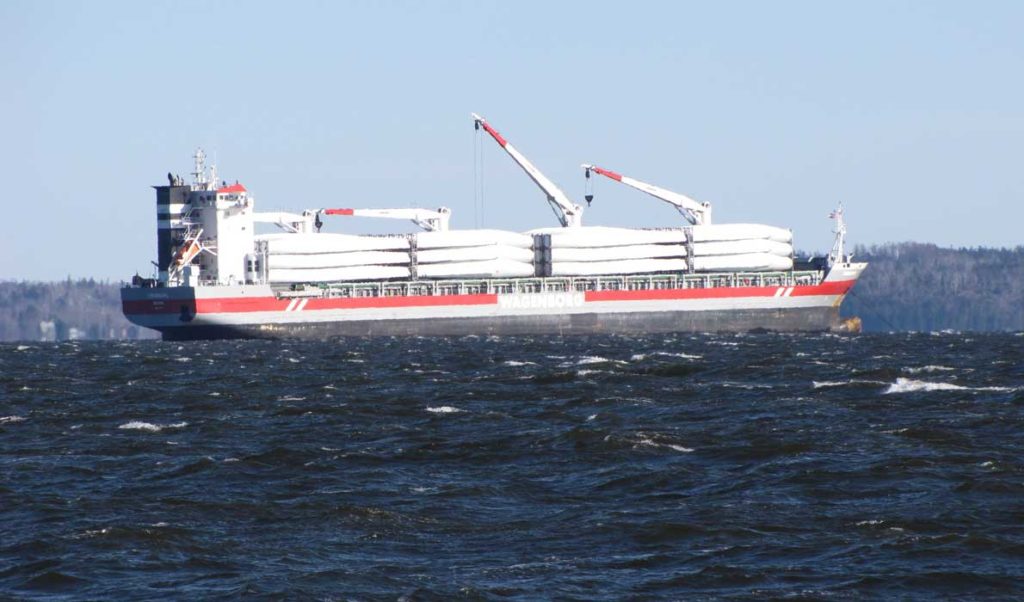By Dan Bookham
Since 2013 when the Icelandic steamship line Eimskip established operations in Portland, there has been growing buzz around Maine’s ocean-driven connections to our north.
Ship calls to Portland’s International Marine Terminal have steadily increased, more and more Maine officials, economic developers and business people have made the trek to Reykjavik to meet the neighbors, and more Maine goods are outbound along Eimskip’s “Green Line” route to Europe.
Most recently, the multi-national Arctic Council held meetings in Portland in October, intensifying the spotlight on our state’s role as a research hub and trading partner throughout the northern latitudes.
It’s all heady stuff, but if we are going to make this a lasting and additive part of our economy, there are a few things we need to pay attention to from the onset, namely:
Understand the geography
There has been a lot of media focus on the Arctic element of this new relationship for Maine. It is an important element and an area where this region has a rich, if slightly obscure, history of engagement. (I suggest a visit to the Peary-MacMillan Arctic Museum at Bowdoin College to learn more).
However, the economic opportunity for Maine relies less on trading above the 66-degree North latitude and on melting ice in the Northwest Passage and more on engaging now with markets along the existing North Atlantic shipping routes. The countries and regions of the High North and Scandinavia are either heavily import dependent, among the wealthiest consumer economies in the world, or both. We don’t have to wait for the environmental catastrophe of Arctic melting to engage here. Our connection to these markets is available now.
Recognize the market
Along with all the current interest in the North Atlantic and High North comes access to resources both established and new to help Maine industries, companies and entrepreneurs connect with market partners. Between the Maine International Trade Center, the University of Southern Maine and University of New England, the New England Ocean Cluster, the Island Institute and Eimskip itself, there’s a lot of brain power and connections waiting for savvy Maine folks. Furthermore, this is much bigger than a Portland-centric opportunity—every part of the state can benefit.
Understand how others see us
We see ourselves too often as a sparsely populated and isolated state somewhat disconnected from the economic and social tides that roll back and forth across the U.S. To our potential partners to the east, we represent a gateway for goods coming in and out of North America, a place with a reputation for high quality produce and product, and a place with a climate, ecology and culture that share many features with those of our trading partners.
We don’t have to stop being ourselves to make the most of our advantages, and we should stop thinking of ourselves as small and isolated. If a truly small and isolated place with a quarter of our population like Iceland can be a regional powerhouse in the North Atlantic, there’s no reason Maine can’t also be one.
Be ready to learn
I recently was part of a delegation of Maine businesses that traveled to Iceland to learn about some of the unique aspects of its aquaculture and offshore fisheries. Coming from a culture of scarcity, Icelanders have found ways to maximize the value of their product that goes way beyond the protein they sell.
The revenue they extract from what we would regard as the waste stream is astounding, and holds many lessons for Maine. As relationships and trust continue to develop and as business begins to grow, I’m hoping we’ll be able to meld our own best practices with new ideas that allow us to not just sell a product but also increase its value.
Think globally, engage locally
It’s worth noting that alongside the harvesters and producers of the actual products bound for markets overseas, Maine’s financial, legal and other support sectors are keeping pace with developments in the export sector and the High North. The true sustainability of North Atlantic-driven growth for all of Maine comes not just from increased commodity sales but also through engaging fellow Mainers with specialized skills and expertise throughout the supply and support chains.
Opportunity waits for Mainers throughout the North Atlantic and High North, and the time to engage is now. If we seize our chance to take the lead we could transform our economic fortunes, not by changing the core values of our state, but rather by embracing them and engaging these markets that share them.
Dan Bookham is a commercial insurance agent at Allen Insurance & Financial of Camden who focuses on cargo, marin, and international exposures alongside more traditional business insurance. He also serves on the board of the New England Ocean Cluster business incubator and is a member of the International Association of Maritime & Port Executives. He lives in Rockland.





